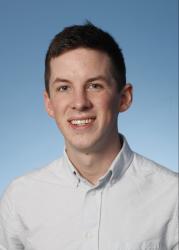This interview is adapted from a segment in the Brookings Cafeteria podcast called “Coffee Break,” where a scholar new to Brookings introduces their background, research interests, and offers book recommendations. The transcript has been slightly edited from the audio recording.
My name is Dany Bahar and I’m a Rubenstein Fellow in the Global Economy and Development program here at Brookings.
 Q: Where did you grow up and what inspired you to become a scholar?
Q: Where did you grow up and what inspired you to become a scholar?
A: I grew up in Caracas, Venezuela (a developing country) and I come from a family of immigrants. My grandparents were all holocaust survivors who arrived from Europe just after World War II. I lived there until college after which I moved to Israel.
While in Israel I joined the Hebrew University of Jerusalem to study a masters in economics (I was originally a computer engineer). And that really inspired me to become a scholar. There [,at the Hebrew University,] I was exposed for the first time to academia in the deep sense of academia with many professors who were world-renowned researchers in economics. And there I understood that there are so many questions that were yet to be answered. I really dug deep into the techniques that economists use to do research and I became excited about doing research.
I was at the time in between being a practitioner and being a researcher in the area of development economics. That’s what led me to the Kennedy School at Harvard a few years later to pursue a master’s in economic development and, at that point after being exposed a little bit more about the world practitioner, I decided to pursue a Ph.D. That’s where I decided I want to have a career that mixes a little bit of research and policy.
Q: What do you think is the most important issue we’re facing today?
A: I think one of the most important issues we are facing –an issue that has kept economists very busy over the past decades— is: what is keeping poor countries from being rich and how can they become rich. And that actually goes beyond countries. You can think about it in terms of people: why are there so many people in poverty, why are so many people stuck in the middle class, and why are there so many firms that are small and unable to grow?
I think that all of those questions are related and today we see how those aspects that we don’t really have good answers to are playing a big role in shaping our politics.
Q: What are you working on now?
A: Development economists understand that there are many things that can help a country grow or can help a firm to grow and those things include a huge range of explanations. Some of them have to do with the institutions the country has. Some of them have to do with endowments—their workers and their machines—and some of them have to do with geography. But the one that economists mostly agree is the most important is productivity.
We don’t really know what productivity is. Basically you should think about it as technologies and things that help us be more productive and to do more with the same resources. And I’ve been really researching a lot on one aspect that makes us more productive, which is know-how or knowledge. How do we learn and how do we know to do more with what we have. And it turns out that that knowledge is something that it’s very difficult to acquire. It’s very difficult to transfer and it really requires human interaction.
Think about a surgeon. For a surgeon to become a surgeon, they need to not only read all the books, but they need to stand next to another surgeon who has a lot of experience to learn. That’s really the only way that they can acquire [the knowledge].
So within that context I’ve been focusing lately on how migrants and refugees could be the key to economic development because they are the main flow that is moving brains from place to place. So when migrants move from one country to another they bring in this knowledge that results in the sending country or the receiving country becoming more productive, being able to open new firms, being able to grow faster.
I’ve also been working a lot on policy aspects of migration and refugees and how important it is to have a comprehensive migration policy that maximizes the benefits of migrants and refugees. In that context, for instance, I’ve been following very closely what’s happening in South America where there have been up to two million people from Venezuela that have fled the country and are establishing themselves in other countries in the region. Fleeing from one of the worst humanitarian crises that we’ve seen in the hemisphere. And we are thinking about how the region as a whole can define a comprehensive policy that will allow these refugees and migrants to settle and to help the development of their receiving countries. And eventually these people will hopefully be the key for growth and the reconstruction of Venezuela.
Q: If you could recommend any book to our listeners, what would it be?
One book that I could recommend to our listeners is “Outliers” by Malcolm Gladwell. I read it a few months ago and it’s really fascinating how he explains that these people that we see as being extremely successful in what they do—as lawyers, or in sports, or any profession—is not just a matter of luck. It’s not just a matter of being talented. Basically, the book is telling us that these people worked really, really hard. Many of them were in the right place and in the right circumstances, and that actually allowed them to become very successful in what they do. The book talks about the “10,000 hours” rule of thumb and basically that people who are very successful in what they do–computer programming, or in sports, or as a salesman, or as a lawyer or a doctor–they probably gathered experience for 10,000 hours, which is a lot of time.
And I think this book is important in the context of the research that we were discussing before because it means that there is a big component in terms of social interactions that keep people from achieving their potential and that should be fixed. But there’s also a big component that gives us hope that everybody can achieve the fullest of his or her potential if they work really, really hard and are prepared to do the thing that they do best when the time comes.



Commentary
Meet Dany Bahar, David M. Rubenstein Fellow in the Global Economy and Development program
August 31, 2018